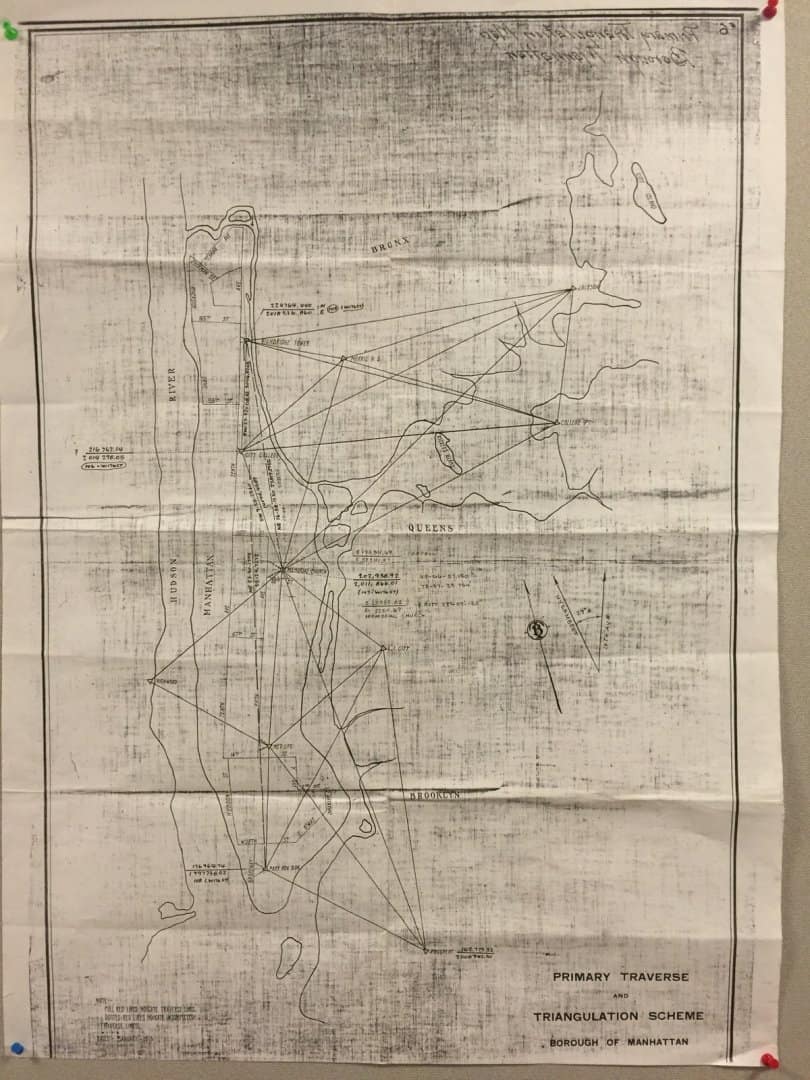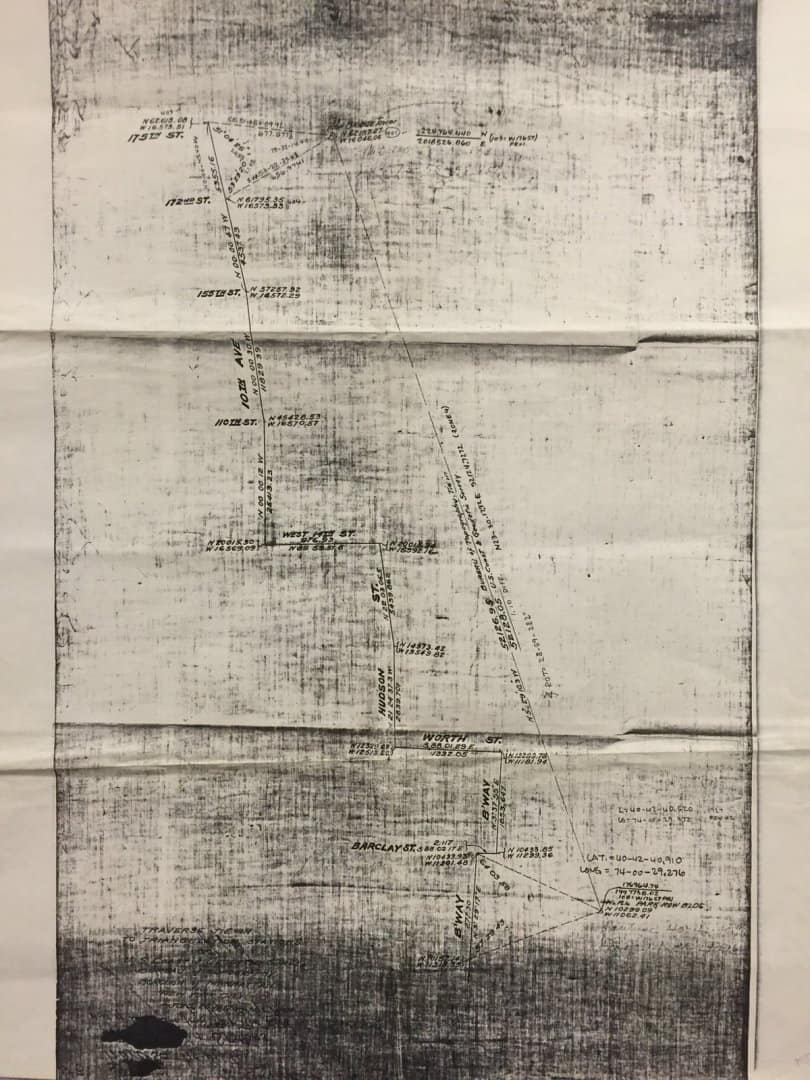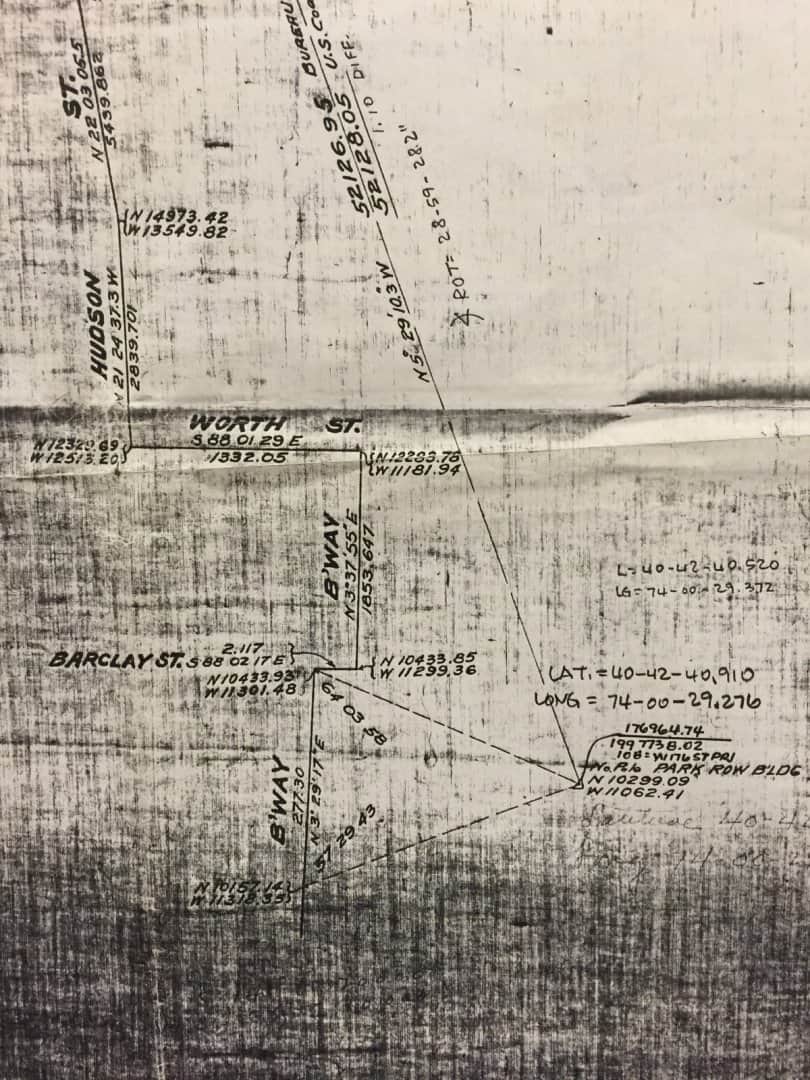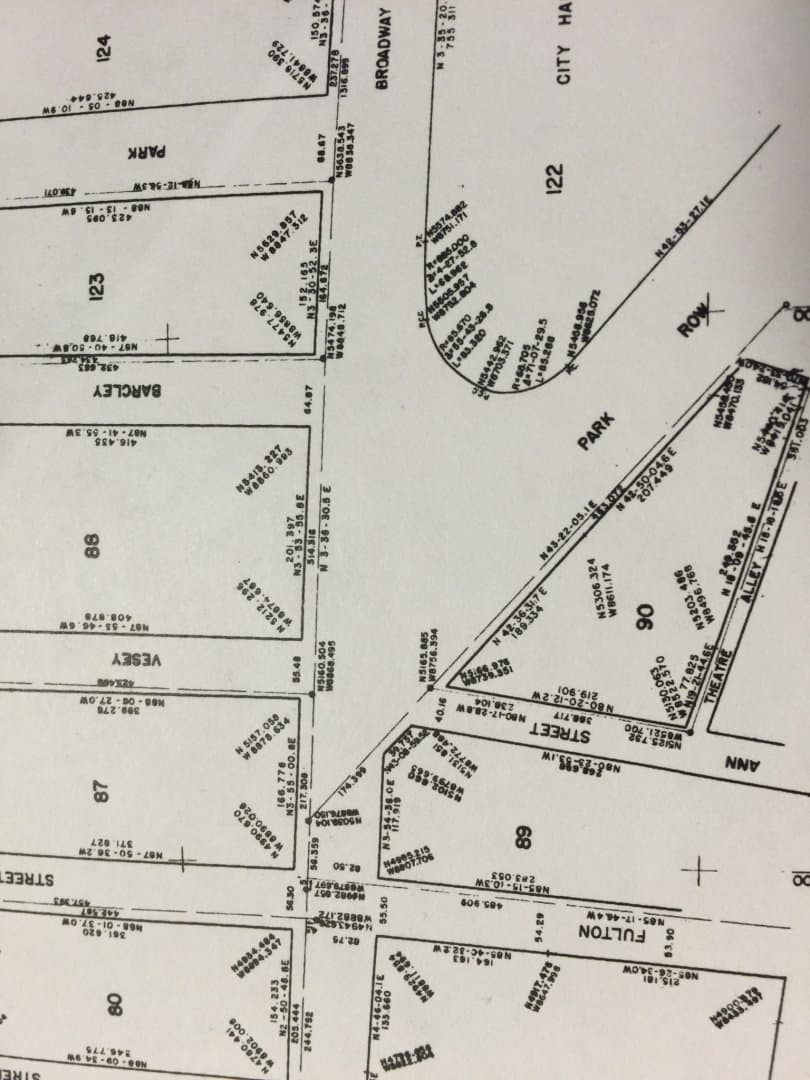I recently followed the route of New York City Primary Traverse line from 1917 and was able to recover one monument in a in a sidewalk box and a brass plug in a granite sidewalk.
The 1917 traverses were based on triangulation.
Another map showing the check line between the triangulation and the precise chaining.
So, I'm not going to say that they were only 0.07 feet off in 10,000 feet. That would be ignorant. But I will say I agreed with them within about 7 ppm.
And that's really satisfying.
What I can't exactly determine clearly is why they took that system of coordinates and changed it.
The two details below show the intersection of Broadway and Barclay Street.
One in the old Borough coordinate system and one in the new borough coordinate system.
I believe the new borough system stems from the WPA surveys of the late 1930s, but just can't figure why the change in coordinates.
I love this stuff, I have dealt with a number of old triangulation nets by the Corps and also the City of Pittsburgh net. They did good work using what is now obsolete equipment. Great to see that NYC maintains that information, while some may think it of little value I believe it is priceless.
Scott Zelenak, post: 385649, member: 327 wrote: I recently followed the route of New York City Primary Traverse line from 1917 and was able to recover one monument in a in a sidewalk box and a brass plug in a granite sidewalk.
The 1917 traverses were based on triangulation.
Another map showing the check line between the triangulation and the precise chaining.
So, I'm not going to say that they were only 0.07 feet off in 10,000 feet. That would be ignorant. But I will say I agreed with them within about 7 ppm.
And that's really satisfying.What I can't exactly determine clearly is why they took that system of coordinates and changed it.
The two details below show the intersection of Broadway and Barclay Street.
One in the old Borough coordinate system and one in the new borough coordinate system.
I believe the new borough system stems from the WPA surveys of the late 1930s, but just can't figure why the change in coordinates.
Sorry Zelenak but it does not look like any CHAINING was done. In the lower left hand corner of your second diagram it says that this was done by
U.S. Coast & Geodetic Survey. And they DON'T chain they TAPE.
JOHN NOLTON
The second set (WPA) seems to more of a localized datum for the area. Maybe there were other surveys from other city agencies and that decided to consolidate all into one.
In John Hamilton's post today on modern mapping, he posted the 1927 specs for the triangulation of Pittsburgh. For establishing tri-stations, on angles...they would do 12 reps with precise instruments and targets of the day. On traverses, 16 reps with 10"-20" transits in 1927.
I have a pamphlet for the Louisiana Geodetic Survey - WPA in the 1930s (Huey Long days). Specs for Traversing along highways for future construction and improvement. These were not ROW stations but geodetic control stations in LA SPC. They did 48 reps per traverse station. I assume that they had a lot of time on their hands because of the lack of work and to keep employed.
So a lot of work was created during the WPA to keep people employed. Maybe a new datum was created for that purpose.
I did some boundary research in a small rural parish (county) here and found a lot of redactions in the original records both in French and English language. I decided to ask one of the clerks about the redactions. They told me during the WPA, somebody was appointed to redact all documents that had any mention of slaves and slaveholders.
Division of National Mapping. Australia
From field practices manual:
1.18 Field Chaining
1.18.1 Chains
Most third order chaining has been done with the 300 foot steel band. However, future chaining will be done with metric bands, probably the 50 metre band. The characteristics of the 50 metre bands currently in use within the Division
I still haven't come across a surveyor that using the verb taping, even when pulling a tape, which most still call a chain.
Larry Scott said: "I still haven't come across a surveyor that using the verb taping, even when pulling a tape, which most still call a chain".
Well Larry when do you want to meet. I have been calling it taping and use the command TAPE since I started surveying in 1962. Heck I will
even buy you a beer when we meet.
JOHN NOLTON
PS I don't care what they call it in Australia.
JOHN NOLTON, post: 385932, member: 225 wrote: Larry Scott said: "I still haven't come across a surveyor that using the verb taping, even when pulling a tape, which most still call a chain".
Well Larry when do you want to meet. I have been calling it taping and use the command TAPE since I started surveying in 1962. Heck I will
even buy you a beer when we meet.JOHN NOLTON
PS I don't care what they call it in Australia.
A Chain is a specific length or a specific device of that length or multiples thereof.
Chaining is a process and is defined as using a chain or a tape, here in the US and especially the PLSS.
A chain is a series of linked measurements, not specific to the device used. One can have a chain of a series of taped measurements.
It is most likely called by you by the first name used for the process on your first day of your first job.
Paul in PA
I wonder how an interesting post about the quality of older work and some really interesting analysis that Scott did devolves into a discussion of terminology (chaining versus taping). John Nolton has to get over whether people call it a benchmark or a bench mark, or whether they are taping or chaining when using a steel tape. I doubt anyone is still using an actual chain (with links). Where I started out in surveying (USACE crew) it was called chaining when we were measuring with a 200' steel tape, but a distance so measured was "taped". I use the term taping now, but consider chaining to be an acceptable synonym.
Now, if you want to get picky with terminology, I hate it when people call a USC&GS or NGS mark a "USGS" mark, or refer to the "USGS Datum".
Being able to speak, understand and converse in various lingos, dialects and languages is a sign of an intelligent person.
In my life I have found when a person begins correcting your vernacular in the middle of a conversation they are not only disregarding you; they're looking for a rationalization within themselves to bolster their own opinions...they're not listening.
[MEDIA=youtube]gGAiW5dOnKo[/MEDIA]
(credit to McCabe)
[MEDIA=youtube]fymw5ie9Zd4[/MEDIA]
John Hamilton, post: 385947, member: 640 wrote:
Now, if you want to get picky with terminology, I hate it when people call a USC&GS or NGS mark a "USGS" mark, or refer to the "USGS Datum".
This annoys me frequently. When will people begin to understand that terminology actually matters?
I know I annoy people when I correct their use of "micro station" when they actually mean InRoads, "AutoCAD" when it should be Civil3D... but when asking me questions like "will microstation do ..." No microstation won't but inroads will.
And then the want the procedure for relocating a USGS Benchmark off the Bridge we're replacing. Well there is no USGS benchmark there, did you mean the NGS benchmark?
Frustrating.
paden cash, post: 385978, member: 20 wrote: when a person begins correcting your vernacular in the middle of a conversation they are not only disregarding you; they're looking for a rationalization within themselves to bolster their own opinions...
[MEDIA=youtube]sxAk3B_zS5k[/MEDIA]
RADAR, post: 386196, member: 413 wrote: ...
That's not a vernacular, that's a derby!
love it!
paden cash, post: 385978, member: 20 wrote: Being able to speak, understand and converse in various lingos, dialects and languages is a sign of an intelligent person.
In my life I have found when a person begins correcting your vernacular in the middle of a conversation they are not only disregarding you; they're looking for a rationalization within themselves to bolster their own opinions...they're not listening.
I was just going to like your post but decided to comment.
I have made an acquaintance this summer of a noted attorney. We talk every few days. On Wednesday, we were riding along and the topic was about the weather.
As were were talking, I mentioned about this weather system sitting off the coast and it appears that a trough was developing. I didn't get the word trough out of my mouth when they corrected my pronunciation. Me, being raised in North Jersey and living in New Orleans can put a new slant on some words.
I said "TR-alf" they correlated me by saying TRoff. Immediate , I thought exactly what you encapsulated in your post .
Robert Hill, post: 386213, member: 378 wrote: I was just going to like your post but decided to comment.
I have made an acquaintance this summer of a noted attorney. We talk every few days. On Wednesday, we were riding along and the topic was about the weather.
As were were talking, I mentioned about this weather system sitting off the coast and it appears that a trough was developing. I didn't get the word trough out of my mouth when they corrected my pronunciation. Me, being raised in North Jersey and living in New Orleans can put a new slant on some words.
I said "TR-alf" they correlated me by saying TRoff. Immediate , I thought exactly what you encapsulated in your post .
As much as like talking, I've learned so much more by just listening. Human language is as diverse as hair or eye color; and probably means very little when it comes to any indication of intelligence. People who feel the need to correct others (particularly mid-sentence) are probably not capable of comprehending the spoken word in any manner other than that with which they are familiar; similar to a primitive savage you might run into in the Mato Grosso.
I would like to think the spoken word is merely a package of sorts, in which one's thoughts and ideas are delivered. Bitchin' about the package in which a message is delivered might distract the listener if someone else is trying' to holler "snake"! What someone is saying is far more important than how they say it.
One of the most intelligent men I have ever met in my lifetime could not read nor write. John was a dirt foreman I had the pleasure of working with for several years. He hailed from the Carolina coast and from his appearance had both black and white parents. John spoke what I later found out was a dying dialect called Gullah. John would have pronounced it "DI-lek". The man was flat hard to understand. I bet it was a year before I could understand his every word.
Once an inspector got frustrated because he couldn't understand John. The man said something derogatory about John's vocabulary and intelligence. John quietly told him, "Ah he-ah you jes fine, and you suh not knowin' a bit o what I say....and you gwine go call me stupid?"
I learned a lot from a man that couldn't read or write, just by listening to him.
Surveying is an old science and art. So its terminology should retain tradition.
And 'chaining' as task, or procedure, doesn't have to describe the architecture of the equipment. And there's no doubt when a distance is chained, it's referring to a metal analog, not EDM.
And you can buy a Lufkin chain. It's not archaic.

I saw a job posting for chainman.
I suppose the job is really for reflector-pole-man.
JOHN NOLTON, post: 385932, member: 225 wrote: Larry Scott said: "I still haven't come across a surveyor that using the verb taping, even when pulling a tape, which most still call a chain".
Well Larry when do you want to meet. I have been calling it taping and use the command TAPE since I started surveying in 1962. Heck I will
even buy you a beer when we meet.JOHN NOLTON
PS I don't care what they call it in Australia.
So John, were the folks on your crew in 1963 called "tapemen" or "chainmen"? I started hanging around my Dad's crews in about 1959, and they used tapes, and they were ALL called chainmen. Never heard anyone use the word tape in common conversation - to this day.
Jim in AZ, post: 386456, member: 249 wrote: So John, were the folks on your crew in 1963 called "tapemen" or "chainmen"? I started hanging around my Dad's crews in about 1959, and they used tapes, and they were ALL called chainmen. Never heard anyone use the word tape in common conversation - to this day.
We use to have a picky fella that usually worked in the office. From time to time he would tend PC duties when the real PC wasn't around. He called it "baby sitting" and we all hated him.
The colloquial terminology for our instrument at that time was a "transit", although it was actually a theodolite. He never missed a chance to correct us. One of the fellas got mad at him one day and told him, "I'd tell you to stuff that theodolite up your butt, but you'd probably want to correct me for not saying rectum." We all got a good laugh.
We use to put 6H in his lead holder when we knew he was going to out in the field with us....








